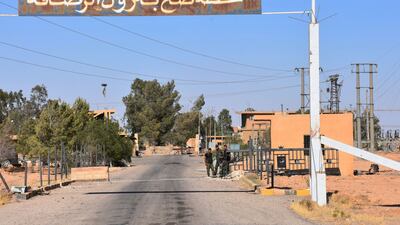The Syrian army backed by heavy Russian air strikes seized a string of oil wells in Raqqa province, as retreating ISIL militants battle to defend their remaining territory in the country.
State-owned Ikhbariyah television quoted a military source on Saturday as saying the army had taken control of Wahab, Al Fahd, Dbaysan, Al Qseer, Abu Al Qatat and Abu Qatash oilfields and several other villages in the desert area that lies in the south-west of Raqqa province.
The seized oilfields lie south of the town of Rasafa and its oil wells, which the army took last month from the militants in their first major territorial gains inside the province.
In the past few months the army and Iran-backed militias have been advancing east of Aleppo city and seizing swathes of territory west of the Euphrates River that militants have pulled out of to defend their self-declared capital of Raqqa, where they are now battling US-backed troops inside the city.
The latest gains tighten the army's grip on a bulge of territory stretching from eastern Hama province to eastern Homs and the edge of Raqqa and Deir Ezzor provinces, the Syrian Observatory for Human Rights said.
The Russian air force has intensified strikes on several targets and towns held by ISIL in the area, according to the Britain-based monitor, which tracks the Syrian conflict through activists in the country.
The Observatory said on Sunday that the civil war, now in its seventh year, has killed about 475,000 people including 99,617 civilians in addition to tens of thousands of troops, opposition fighters and extremists, as well as pro-government gunmen. It said it had identified 331,765 of the dead.
The Observatory said the army's next goal is to retake the town of Sukhna, a gateway to the eastern province of Deir Ezzor that borders Iraq and is likely to be the militants' last major bastion in Syria if Raqqa falls.
The army and its Iran-backed allies have also announced steady gains in the desert north-east of the ancient city of Palmyra in recent days, with the capture of the Hail gas field bringing them to within almost 18 kilometres south of Sukhna.
Heavy fighting has however continued in the last 48 hours near Hail and the nearby Arak gas field that the army took last month, both the Observatory and extremist websites said.
The army and Iran-backed militias have pressed a campaign since May to fill the void left by the retreat of militants in areas they once controlled in the vast eastern Syrian desert that stretches all the way from central Syria to the south-eastern border with Iraq and Jordan.
The military and allied forces have also been engaged in heavy fighting with western-backed Free Syrian Army (FSA) rebels in the rugged eastern countryside Sweida province in southern Syria.
The army said it had captured most of these areas that are also near the border with Jordan, while the rebels said they had inflicted losses on Lebanon's powerful Hizbollah group and Iraqi Shiite militias.
Syria's civil war began in 2011 as an uprising against president Bashar Al Assad but has been complicated by the emergence of ISIL and other extremist groups as well as the involvement of western and regional countries backing rebels groups, and Russia and Iran on the side of the government.
Shelling by rebels on the outskirts of Damascus damaged the Russian embassy compound and a nearby area on Sunday, and wounded seven people in other parts of the city. Government forces have been pounding rebel-held areas near the capital for days.
The shelling came hours after a bomb exploded near a hospital in the rebel-held north-western city of Idlib, wounding five people.
Elsewhere in Syria, state media said three people were killed by two mines planted by ISIL near the central village of Um Harteen, and seven people were wounded when a blast hit a bus in Sweida province.
A “terrorist explosion” in Ras Shamta, a town about 12km north of the government-held coastal city of Latakia resulted in casualties, state television said. It gave no further details.

